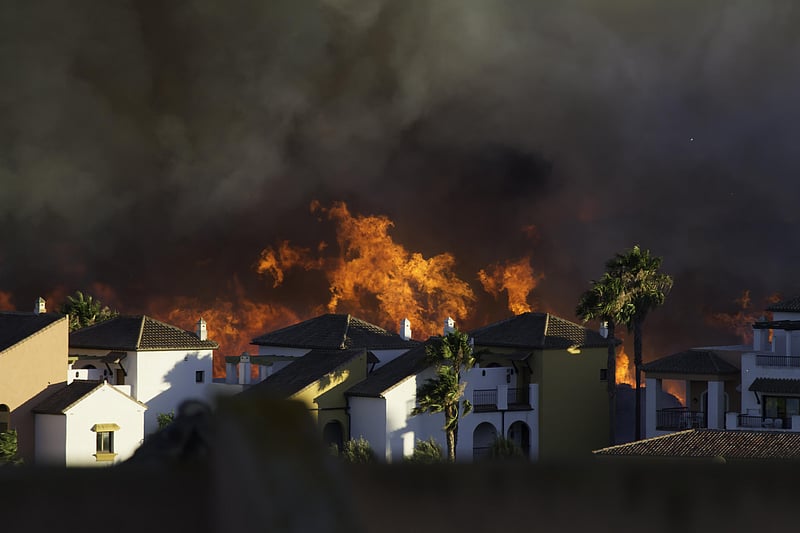Get Healthy!

- Denise Mann
- Posted May 16, 2022
Wildfire Survivors Could Face Higher Cancer Risk
Wildfires, like the one currently raging in New Mexico, are known to cause upticks in breathing issues and heart attacks in their immediate wake for folks who live nearby.
Now, new Canadian research shows that these fires may also increase risk for lung and brain cancer over time.
People who lived within about 30 miles of wildfires over the prior 10 years were 10% more likely to develop brain cancer and had a 5% higher risk for lung cancer, compared to folks living further away from these fires.
"We saw a consistent signal for lung and brain cancer risk among people who live near wildfires," said study author Scott Weichenthal. He's an associate professor in the Department of Epidemiology, Biostatistics and Occupational Health at McGill University in Montreal. "We know that a whole range of carcinogens are released during wildfires that may increase the risk for these cancers."
Wildfires typically begin in forests, grassland or prairies, and are often caused by campfires left unattended, still-lit discarded cigarette butts, sparks from power lines, or arson.
These fires tend to occur in similar parts of the country, so people living in these areas can be continuously exposed to the potentially cancer-causing wildfire pollutants, the study authors noted.
Making matters worse, "wildfires are occurring more frequently, covering larger parts of the country, and wildfire season is starting earlier," Weichenthal said. These changes are likely due to global warming and climate change, he believes.
For the study, Weichenthal and his colleagues (including PhD student Jill Korsiak, who led the analysis), tracked 20 years of data on more than 2 million Canadians to learn more about how wildfires affect people's risk for certain cancers.
The study wasn't designed to look at specific toxins in smoke that may increase cancer risks. "There's still a lot to learn about the kind of pollution that sticks around after the fire," Weichenthal said.
It's not just about outdoor air pollution: "Wildfires also pollute water, soil and indoor air," he noted.
Dr. Mary Prunicki, who reviewed the new study, stressed that "we know more about the short-term effects of wildfires than we do about their long-term impact." She directs air pollution and health research at the Sean N. Parker Center for Allergy Research at Stanford University School of Medicine in California.
On the day of and days immediately following a wildfire, there's an uptick in hospital visits for asthma attacks, chronic obstructive pulmonary disease (COPD) exacerbations, and other lung conditions, Prunicki said.
"There is a strong literature showing an increase in heart attacks, cardiac arrests and strokes among people who have been exposed to wildfire smoke, especially those who have a preexisting condition," she explained.
Anyone living near wildfire smoke may have burning eyes, a runny nose, cough and/or difficulty breathing.
Exactly what's in the smoke depends on what is burning, Prunicki said, but "in general, wildfires contain small particulate matter that can penetrate deep into the lungs and cause health problems.
"There are various toxins that could be in the smoke that have already been associated independently with increases in lung cancer, including polycyclic aromatic hydrocarbons [PAHs]," she added.
There are steps you can take to protect your health if you live in a part of the country where wildfires are common. According to Prunicki, these including understanding your indoor air quality, and if it's poor, using an air purifier or a high-efficiency particulate air (HEPA) filter in your central air conditioning or heating unit. These filters can help remove pollutants from the air you breathe.
Also, "if you have underlying heart or lung conditions, make sure you have your medication at the ready, too," Prunicki said.
It's important as well to reduce the risk of wildfires when you're enjoying the great outdoors, including dousing your campfire with water until it's cold to make sure it is really out.
The new study was published in the May 2022 issue of The Lancet Planetary Health.
More information
Sign up for local air quality notices via the Environmental Protection Agency.
SOURCES: Scott Weichenthal, PhD, associate professor, Department of Epidemiology, Biostatistics and Occupational Health, McGill University, Montreal, Quebec, Canada; Mary Prunicki, MD, PhD, director, air pollution and health research, Sean N. Parker Center for Allergy Research, Stanford University School of Medicine, Stanford, Calif.; The Lancet Planetary Health, May 2022







